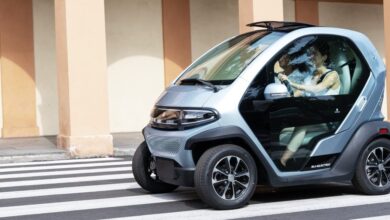China EV insurance registrations for week ending Apr 28: Nio 4,960, Tesla 14,860, BYD 63,300
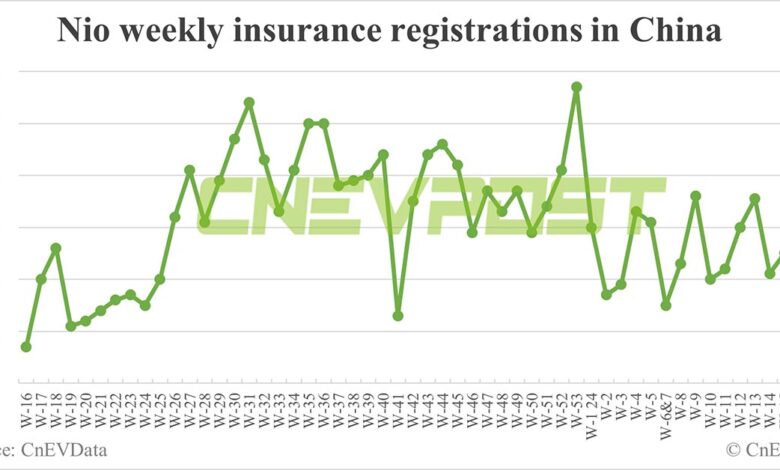
Xpeng had 2,700 insurance registrations last week, Li Auto 7,060, Zeekr 5,000 and Xiaomi 1,670.
Major electric vehicle (EV) companies saw insurance registrations in China rise last week, as month-end deliveries are typically higher.
For the week of April 22-28, Nio (NYSE: NIO) saw 4,960 insurance registrations of its vehicles in China, up 65.89 percent from 2,990 the week before, according to data shared by several Weibo bloggers and cross-checked by CnEVPost.
For the past year, Li Auto (NASDAQ: LI) would publish weekly insurance registrations figures every Tuesday, but it has stopped doing so.
Nio delivered 11,866 vehicles in March, up 45.92 percent from 8,132 in February, and up 14.34 percent from 10,378 a year ago, according to data it released on April 1.
The electric vehicle (EV) maker is expected to release April delivery figures tomorrow.
Earlier today, Nio said it delivered the first batch of the 2024 ET7, a refreshed sedan that went on sale on April 25, the first day of the Beijing auto show.
Tesla (NASDAQ: TSLA) saw 14,860 insurance registrations in China last week, up 187.98 percent from 5,160 the week before.
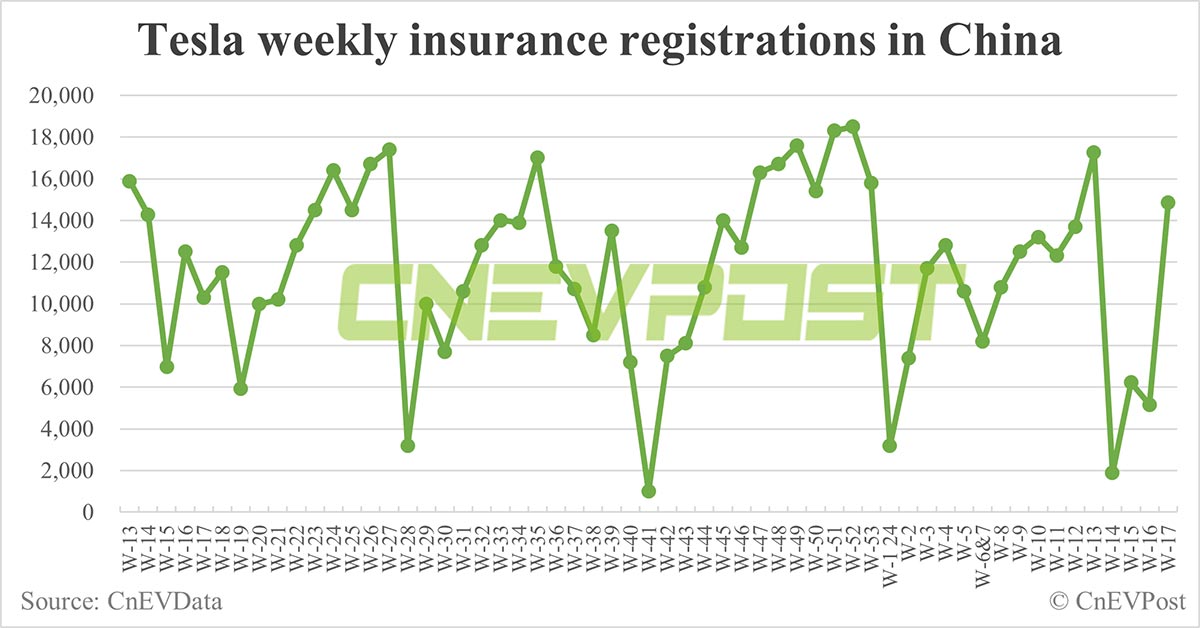
The Model Y remains Tesla’s main sales driver, with 12,600 insurance registrations in China last week.
Tesla has a factory in Shanghai that produces the Model 3 and Model Y, which not only delivers to local consumers, but is also an export hub for it.
On April 21, Tesla lowered the prices of its entire lineup of models in China, with the prices of the Model 3 and Model Y, the imported Model S and Model X all cut by RMB 14,000 yuan ($1,930).
Yesterday, Bloomberg reported that Tesla cleared a key hurdle to launching advanced assisted driving feature in China by partnering with Baidu on mapping and navigation capabilities.
In March, Tesla sold 62,398 vehicles in China, up 107.02 percent from 30,141 in February, though down 18.61 percent from 76,663 a year earlier.
Its Shanghai plant exported 26,666 units in March, down 11.77 percent from 30,224 units in February and up 118.47 percent from 12,206 units a year earlier.
BYD (HKG: 1211, OTCMKTS: BYDDY) had 63,300 insurance registrations in China last week, up 6.44 percent from 59,470 the week before.
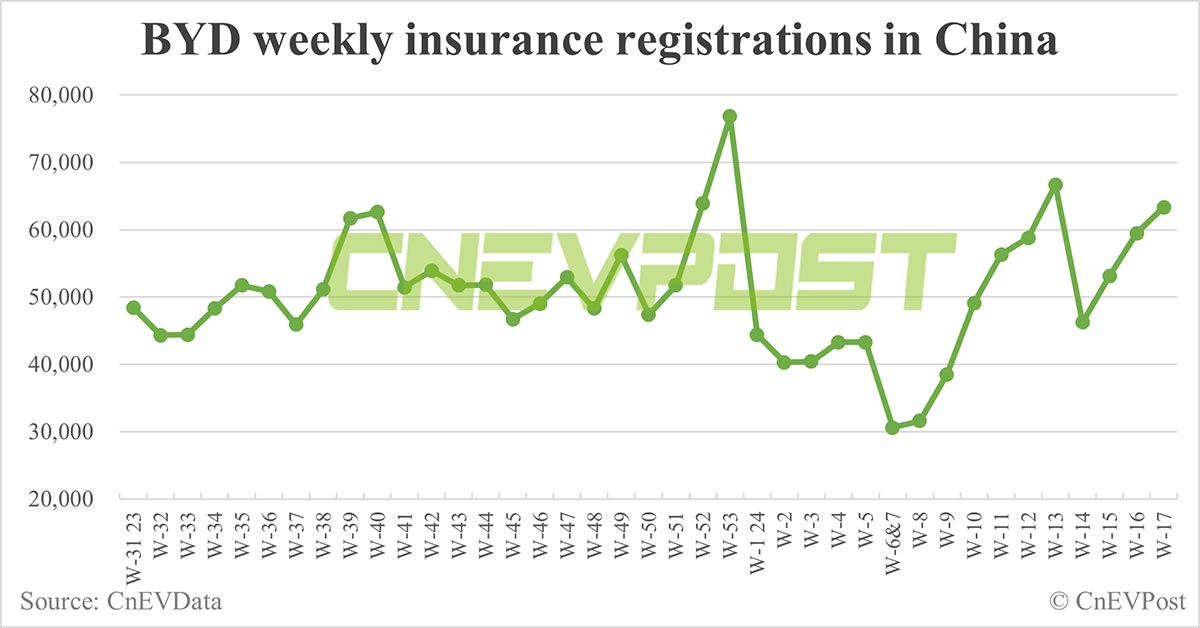
BYD sold 302,459 new energy vehicles (NEVs) in March, the second highest ever behind last December’s 341,043, according to figures it announced April 1. That’s up 147.29 percent from 122,311 in February and up 46.06 percent from 207,080 in the same month last year.
Internal sales target for BYD-branded vehicles in 2024 is 3.3 million units, excluding overseas markets, according to a report by local media outlet LatePost on April 1.
BYD Group currently owns brands including BYD, Denza, Yangwang and Fang Cheng Bao, with BYD-branded passenger cars including the Dynasty and Ocean series.
Xpeng (NYSE: XPEV) had 2,700 insurance registrations last week, up 9.76 percent from 2,460 the week before.
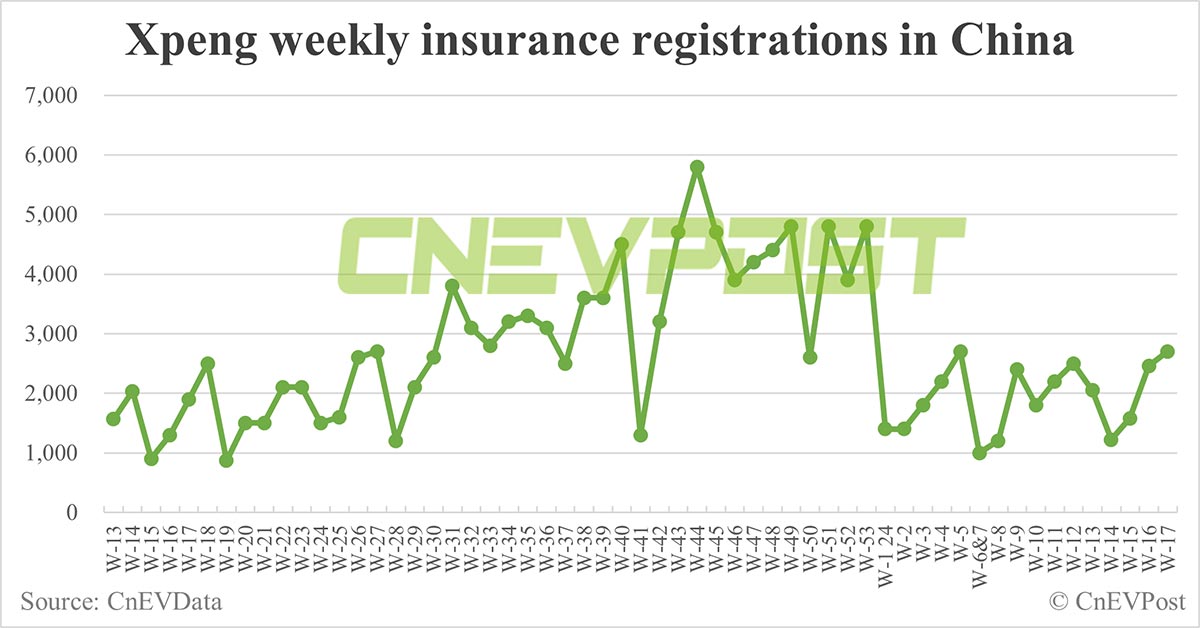
The company delivered 9,026 vehicles in March, up 98.6 percent from 4,545 in February and up 28.91 percent from 7,002 a year ago.
Xpeng launched a new, lower-priced variant for the G6 on April 11 and continues to offer a limited-time discount of RMB 20,000 on all G6 variants.
Li Auto (NASDAQ: LI) saw 7,060 insurance registrations last week, up 58.3 percent from 4,460 in the previous week.
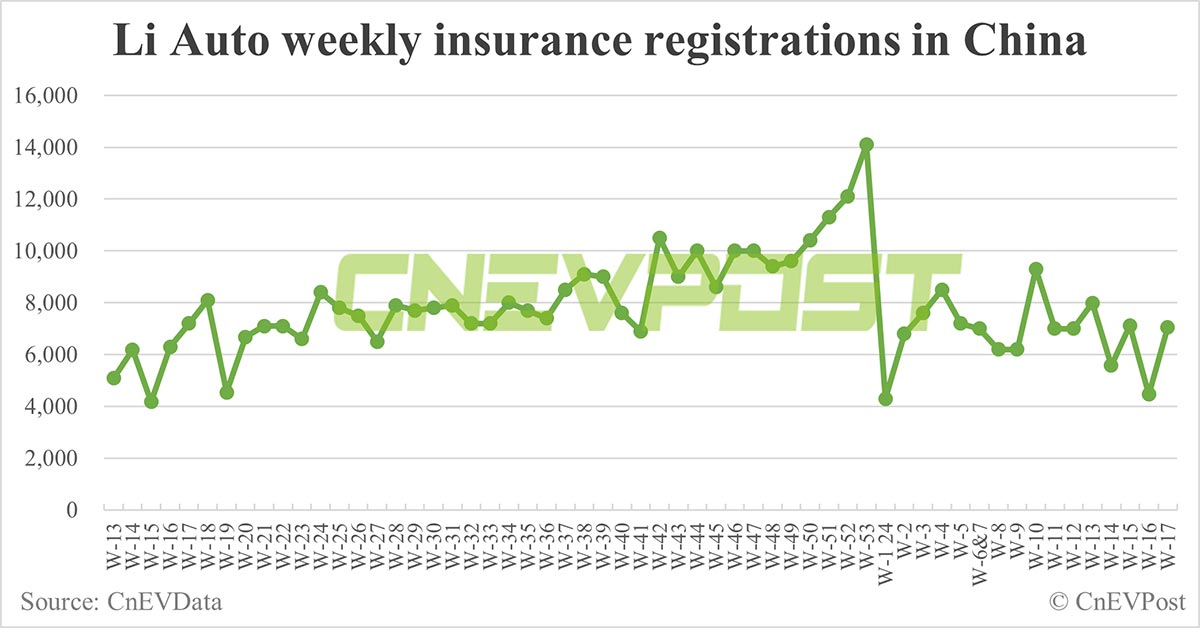
Until the end of March, Li Auto continued to share weekly sales figures every Tuesday for months to show it was leading the pack of new EV makers.
But the company stopped sharing those numbers after its first battery electric vehicle (BEV), the Li Mega MPV (Multi-Purpose Vehicle), saw poor initial acceptance.
Li Auto delivered 28,984 vehicles in March, up 43.12 percent from 20,251 in February and up 39.19 percent from 20,823 a year ago.
On April 22, Li Auto drastically cut the prices of all its models except the newly launched Li L6, the first local carmaker to follow suit after Tesla’s price cut.
Xiaomi (HKG: 1810, OTCMKTS: XIACY) had 1,670 insurance registrations last week, down 1.18 percent from 1,690 the week before.
Xiaomi officially launched its first EV model, the SU7, on March 28 and said the model received 88,898 firm orders in the first 24 hours.
Yesterday, Xiaomi said it saw the 10,000th mass-produced SU7 roll off the production line, 32 days after the model was launched.
Aito, Huawei‘s joint automotive brand with Seres Group, had 7,030 insurance registrations last week, up 17.17 percent from 6,000 the week before.
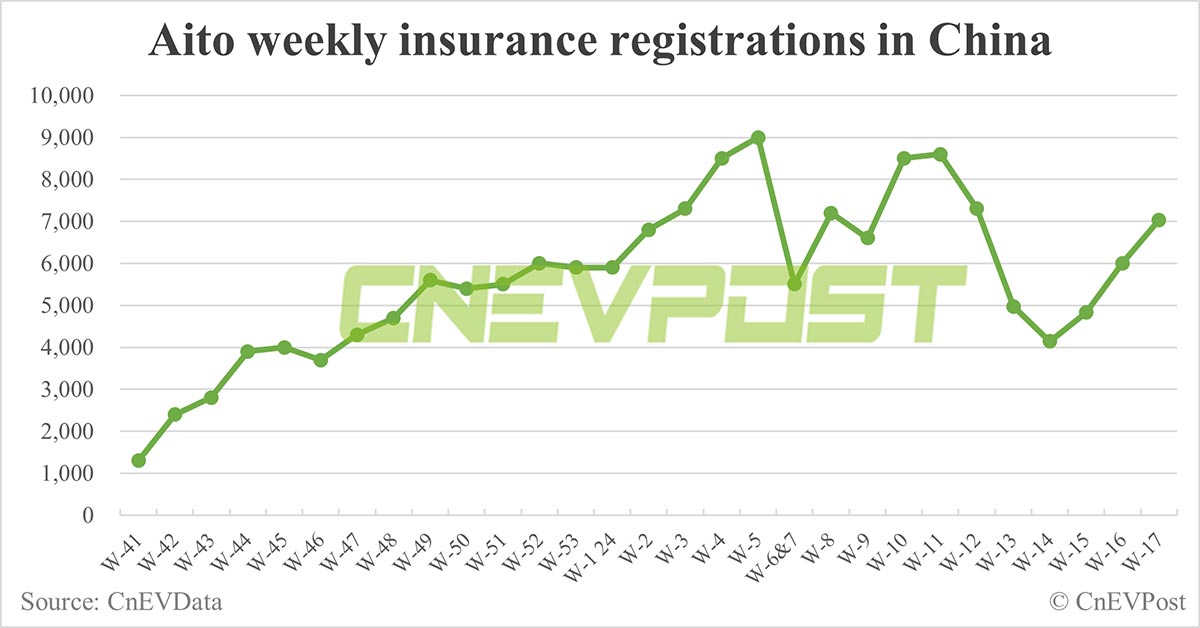
Zeekr had 5,000 insurance registrations last week, up 59.24 percent from 3,140 the week before.
Leapmotor was 4,040 last week, up 5.76 percent from 3,820 the week before.
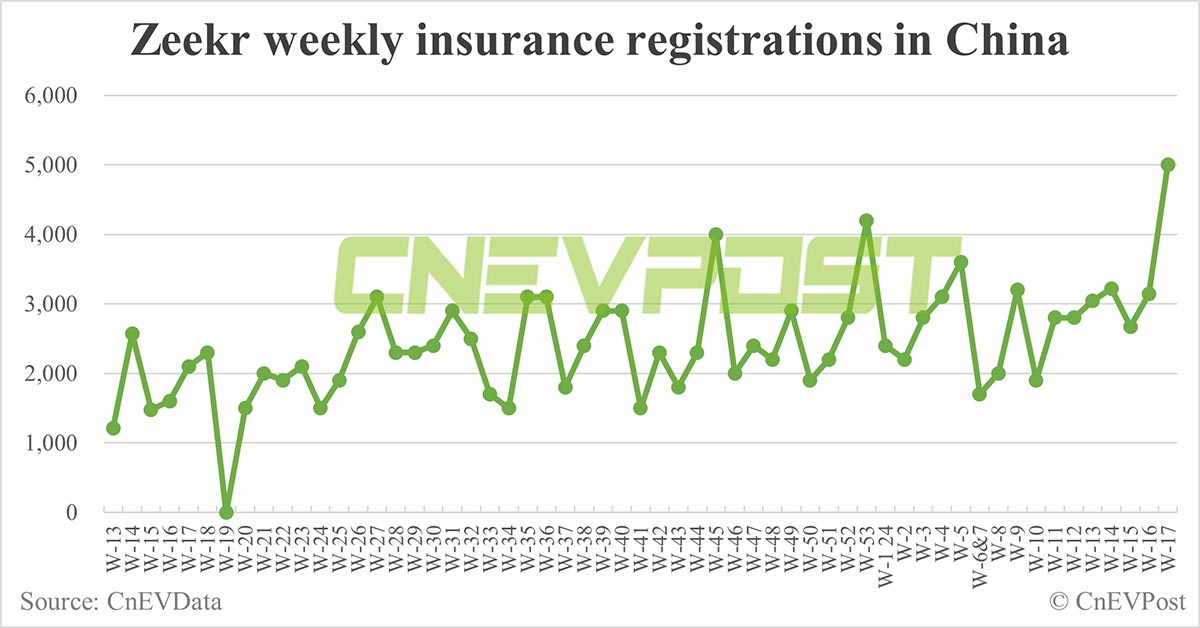
($1 = RMB 7.2426)
Nio starts trial run of 150-kWh semi-solid battery packs, official operation to begin on Jun 1
